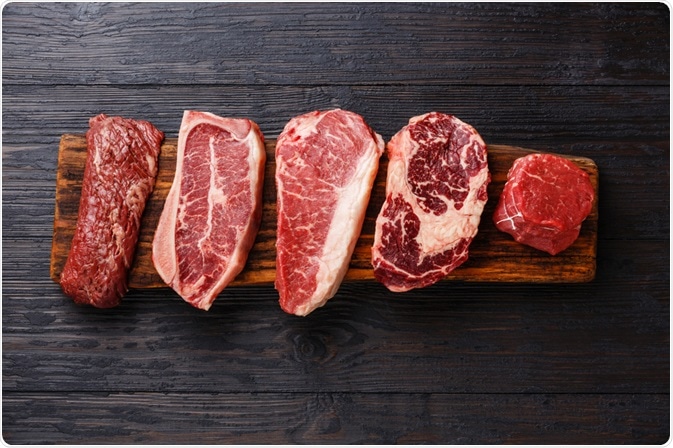Several of the nutrients and contents of red meat have been associated with worsened health outcomes, such as cardiovascular disease and cancer. Arachidonic acid, for example, is implicated in elevated inflammation risk and cardiovascular disease.

Image Credit: Natalia Lisovskaya/Shutterstock.com
Polyunsaturated fatty acids
Arachidonic acid can be produced from n-6 polyunsaturated fatty acids, also known as omega-6 fatty acids, that go through desaturation and elongation reactions. While endogenous levels are difficult to measure, increased levels are associated with increased consumption of red meat and, in some cases, offal and eggs.
Other sources of polyunsaturated fatty acids, such as cooking oils, have not been associated with higher arachidonic acid concentrations.
n-6 polyunsaturated fatty acids should not be confused with n-3, or omega-3, fatty acids. The health benefits of n-3 fatty acids are better documented, and associated with increased consumption of fish. The health benefits starkly contrast those of n-6 fatty acid-derived arachidonic acid, including reduced inflammation and lower risk of coronary artery disease.
n-6 and n-3 polyunsaturated fatty acids share a clear dietary relationship. Some studies show that a high dietary ratio of n-6 to n-3 fatty acids increases the risk of health complications, such as obesity, liver disease, and cardiovascular disease. Arachidonic acid has also been implicated in cancer, especially for tumors that express COX-2.
How nutritional content can be managed
With a better understanding of what makes red meat unhealthy, and what makes other meats such as fish healthier, there is an opportunity to decrease undesired nutrients in human diets. It has been suggested that the composition of the animal feed significantly influences the fatty acid composition.
In broiler chickens, feeds composed of n-3 fatty acids improved the n-6 to n-3 fatty acid ratio. Improving such ratios can allow people to rely on meat, rather than fish oil capsules or other supplements, for correcting the n-6/n-3 fatty acid ratio.
Red meat, while associated with health issues, also contains beneficial nutrients such as protein, iron, zinc, and vitamins B and K. Supplementing the feed of finishing bulls with selenium, vitamins D, E, and K, and n-3 polyunsaturated fatty acids have been shown to affect meat composition by lowering the n-6 to n-3 fatty acid ratio by as much as a quarter and increasing vitamin content by more than 100%.
In general, the optimal way to correct n-6/n-3 fatty acid ratios and to reduce arachidonic concentration is to alter the animal feed, because arachidonic acid comes almost only from animal meat. The n-6/n-3 fatty acid ratio of the feed should not exceed that of natural feed for the animal.
What nutritional content means for dietary recommendations
With growing evidence that the nutritional content of meats can be influenced by the feed they are given, there are arguments for how this changes dietary recommendations. Several countries, such as Australia, USA, and Norway, have issued recommendations to its citizens in the last 10 years to cut down on red meat intake, both for the sake of the environmental concerns associated with red meat consumption and for health aspects.
While environmental concerns are still not solved, the manipulation of the nutritional content via feed changes can significantly alter the health aspects behind recommendations to cut down on red meat. For example, when the feed of the finishing bulls was supplemented, the meat met the requirements which allow it to be labeled as food with “significant amounts of vitamin K and vitamin D”, which may influence consumers.
Diets high in red meat and mixed meat sources are more common in richer countries. Less affluent populations can be restricted in the amount of animal food they eat, which makes the nutritional content of their animal food of higher priority. Because they may be expected to rely on endogenous production of polyunsaturated fatty acids, the polyunsaturated fatty acids that are consumed from meat must have an optimal ratio of n-6/n-3 fatty acids.
Sources
Seah, J.Y.H. et al. (2017). Consumption of red meat, but not cooking oils high in polyunsaturated fat, is associated with higher arachidonic acid status in Singapore Chinese adults. Nutrients. https://doi.org/10.3390/nu9020101
Haug, A. et al. (2018). Feeding potentially health-promoting nutrients to finishing bulls changes meat composition and allows for product health claims. Meat Science. https://doi.org/10.1016/j.meatsci.2018.07.015
Haug, A. and Christphersen, O.A. (2011). Animal products, diseases, and drugs: a plea for better integration between agricultural sciences, human nutrition, and human pharmacology. Lipids in Health and Disease. https://doi.org/10.1186/1476-511X-10-16
Last Updated: Jan 23, 2020